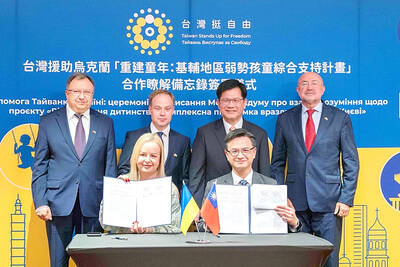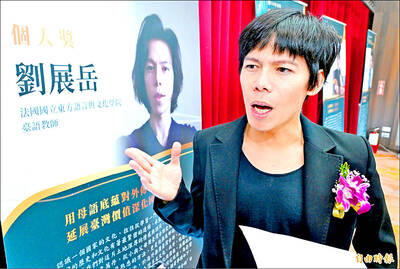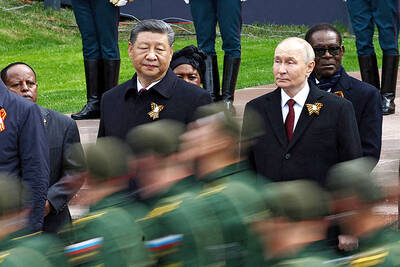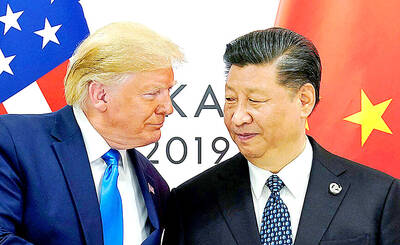South Korea's foreign minister resigned yesterday in a row pitting pro-US ministry officials against left-leaning presidential aides over Seoul's policy toward the US and North Korea.
President Roh Moo-hyun's personnel secretary said Roh had accepted the resignation of Yoon Young-kwan, a moderate who departs at a pivotal moment in multinational efforts to resolve a crisis over North Korea's nuclear weapons programs.
Jeong Chan-yong said in a statement Yoon had resigned to take responsibility for failing to guide foreign policy in line with directives from Roh's year-old administration. Foreign policy analysts said there was little doubt Roh had dumped Yoon.
"Some Foreign Ministry staff were unable to shed the past foreign policy and failed to adequately understand the basic spirit of the new independent foreign policy advocated by the People's Participatory Government," Jeong told reporters.
The "People's Participatory Government" is the slogan Roh's team uses for its populist administration, which calls for more independence from Washington and closer ties to North Korea.
Jeong said the presidential Blue House was reviewing three or four potential successors to Yoon, who helped put Roh's ties with the US on a smooth footing after a rocky start.
Yonhap news agency reported that Yoon's replacement could be named as early as today. The agency said possible candidates included Han Sung-joo, South Korea's ambassador in Washington, and two senior Roh aides: National Security Adviser Ra Jong-yil, and Foreign Policy Adviser Ban Ki-moon.
The president has faced criticism over a political funding scandal, labor strife and a sluggish economy but had been given relatively high marks for stabilizing ties with Washington.
"The resignation could very well signal a change in Korea's foreign policy direction, especially in relations with the US," said Lee Jung-hoon, professor of international studies at Yonsei University.
"If [Yoon's successor] is a person who shares more ideals with the National Security Council, the alliance with the US will become more difficult," he said. The NSC reports to Roh. Conservatives have dubbed some of its aides "Red Guards."
But Unification Minister Jeong Se-hyun said in an interview that he didn't anticipate big policy changes.
"I don't think there will be particular problems in the alliance with the US just because the leadership at the Foreign Ministry is changed," he said.
The dispute -- billed by local media as a battle between the "Alliance Faction" and the "Independence Faction" -- erupted late last year with media reports that senior diplomats had disparaged members of Roh's National Security Council as amateurish.
Roh's mostly young and nationalistic NSC advisers in turn criticized the diplomats as being too pro-American. Many opposed Seoul's decision to send troops to Iraq and advocated a softer line on communist North Korea and its nuclear arms programs.
"The [US] alliance is important because peace with North Korea is not complete," Yoon said at a farewell meeting with grim-faced ministry staff.
"We have the six-party talks and the effort to rescue North Korea's economy, and we also need to help change North Korea's diplomatic isolation," he added.
"There should be balance in the way we look at international politics. We should not lean to the left or to the right."
One of the South Korean diplomats at the center of the row is in Washington discussing ways to restart six-way talks on the North Korean nuclear crisis. The talks involve the two Koreas, the US, China, Japan and Russia.
The trigger for the row that cost Yoon his job was contentious negotiations with Washington on relocating US military bases, including a huge one in the heart of Seoul.

Minister of Foreign Affairs Lin Chia-lung (林佳龍), currently visiting Poland, on Sunday witnessed the signing of a pact between Taiwan and Ukraine designed to provide aid for underprivileged Ukrainian children. Lin departed Taipei on Saturday and arrived in Poland on Sunday ahead of his scheduled speech at the Warsaw Security Forum. The memorandum of understanding was signed by Representative to Poland Jeff Liu (劉永健) and Tetiana Badylevych, deputy director of the Kyiv City Center for Social Services for Families, Children and Youth. The agreement aims to help underprivileged children in the Kyiv area, particularly those who lost their parents during the Russian invasion. The

Courses on native languages of Taiwan run by the Institut National des Langues et Civilisations Orientales’ Taiwan Studies Program in collaboration with multiple Taiwanese higher education institutions have attracted hundreds of sign-ups from Europe. Program director and Hoklo (commonly known as Taiwanese) lecturer Liu Chan-yueh (劉展岳) said the courses would be taught via an online learning platform commencing next month. The platform not only enables foreigners from across the globe to learn about Taiwan, but would also train Taiwanese language teachers to help foreigners learn Taiwan’s native languages as second foreign language, he said. A total of 28 courses would be available, including

LEAKED FILES: While China has the better equipment, Russia can offer combat experience, possibly helping speed up Beijing’s airborne program by 10 to 15 years Russia is selling military equipment and technology to China that could help Beijing prepare an airborne invasion of Taiwan, according to an analysis of leaked Russian documents by a UK-based defense and security forum. The Royal United Services Institute’s (RUSI) analysis is based on about 800 pages of documents, including contracts and lists of equipment to be supplied by Moscow to Beijing, from the Black Moon hacktivist group, which previously published some of the documents online. It does not identify its members, but describes itself in a manifesto as opposed to governments that carry out aggressive foreign policy. The authors of the

WINDOW: Xi Jinping is likely to view upcoming interactions with Trump as the best opportunity to undermine ties and weaken confidence in the Taiwan-US relationship Attempts to exploit political transition in the US to create a “strategic gap” disregard Washington’s strategic policy on Taiwan and would not succeed, a Taiwanese national security official said yesterday. The remarks came as a response to a Wall Street Journal (WSJ) article on Saturday that reported that Chinese President Xi Jinping (習近平) aims to pressure Washington into explicitly opposing Taiwanese independence, following renewed high-level US-China exchanges. The Taiwanese official, speaking on condition of anonymity, said it is unsurprising that China seizes every possible opportunity to undermine the mutual trust and cooperation between Taiwan, the US and their allies. “Beijing once believed